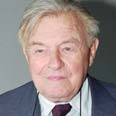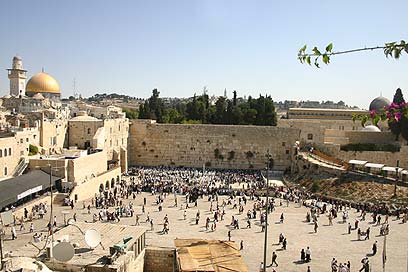
Teddy Kollek, the legendary mayor who served Jerusalem for three decades, died Tuesday morning at the age of 95. Among the things he left behind was the ever-raging debate about a unified Jerusalem.
For hundreds of thousands of Jerusalemites, Kollek represented a unified city. For years, Kollek was proud of the "inheritance" he left behind – a united city and 23 new community centers.
Nonetheless, as the years progressed, more and more voices have come forward saying the city is not connected, but rather divided. Kollek's death brings up the need to reassess the issue of unification, which a number of researchers deem unsuccessful.
"There's no doubt that the city is physically unified, but the question is whether it's socially unified, and there's a big question mark on that," said Israel Kimchi, from the Jerusalem Institute for Israel Studies.
The Institute was founded by Kollek, in conjunction with then Hebrew University president Professor David Amiran.
"Jerusalem was always a mosaic of societies and ethnic communities and the city is divided into three populations: religious-haredi, secular and Arab, so one could say that the city is divided," he explained.
Kimchi did note that, although the sectors are geographically separated, anyone can enter all sections of the city and there is a joint infrastructure in the entire city.
If this is the case, perhaps it was never possible to truly unify all of the city's populations?
"Jerusalem was divided before Teddy…It's a city with special traits. When Teddy spoke of unity, he probably thought of physical and infrastructural unity – a unified city," Kimchi stated.
Kimchi said he worked for more than twenty years with Kollek, who always pressed for unifying the city's infrastructure: He ordered moving activities to East Jerusalem, paving roads and said repeatedly that he wasn't doing enough in these areas.
"There's no doubt that (Kollek's) contribution to uniting the city was huge. He was the right person in the right place. He understood what he wanted to do and had excellent people working around him."
Looking back, what are the implications of uniting the city?
"The political implications are that Jerusalem is in the heart of the storm, without having a solution to the 'Jerusalem problem'. Without any geopolitical solution, there will not be peace in the area."
"There's no doubt that the act of unification, which constitutes the root of the problem, will require a solution in the future."
What do you think Teddy would have suggested for Jerusalem today?
"It's possible that he would discuss separation in certain parts of Jerusalem, with special arrangements regarding the Old City, which might need a third party to aid the two sides that don't get along."
"He would require concessions from both sides, dull the issue of sovereignty and put an emphasis on services in East Jerusalem."

A city divided: Jerusalem's Western Wall (Photo: Ron Peled)
Do you think Teddy failed to analyze the situation?
"I don't think so. Following unification, he threw himself into action. He built a public library in Eastern Jerusalem and other centers…Perhaps the idea of unification was naïve in a way, considering the developments in the Middle East."
How connected was he to East Jerusalem?
"Very connected. He would take us on tours at five in the morning…Many respected people would talk to him."
What can you tell us about Teddy as a mayor?
"He was full of charm, knew how to look out for his workers, but demanded a lot from them…He was like the father of the city. If he went over a pothole in his car, within an hour, it was fixed."
"It was fatherly love, a love with no bounds and full of action. We don't have people like that today, and we can see that very well."
In Palestinian eyes, Jerusalem still divided
Needless to say, the Palestinian side of the city sees things a little differently. "Jerusalem is still divided," said former Palestinian parliament member Ziyad Abu Ziyad.
"You can't aim for unification without acknowledging the nationalism and religious feelings of both sides in the Holy City. Therefore, I support a Jerusalem that is physically unified but politically separate – two capitals for two states, Israel and Palestine."
"The unification of Jerusalem needs to be the unification of nations, not land – not to coerce the will of one side on the other side, but to live jointly according to the will of both sides."
Head of the National Christian Coalition Dimitri Diliani, who also ran for Palestinian parliament, believes that the city cannot be joined together, because it's simply unnatural.
"Kollek's vision goes against the reality on the ground. On the ground, we say there's East Jerusalem and West Jerusalem. Maybe they were united before 1948, but now they cannot be unified, unless the solution is a city that will be open to everyone, under joint sovereignty."
Palestinians aren't the only ones who believe that Kollek's vision has failed. Kolleck's former advisor on the Arab sector in Jerusalem Amir Hashin believes Kollek's vision was reasonable, but didn't have a large enough budget to be implemented.
"Both the municipality and government brought about a situation where the city is more divided than it was in 1967…Since Teddy and up to today, the whole idea of unification was given an incorrect meaning."
"The Israeli establishment thinks that greater Israeli presence in East Jerusalem means unifying Jerusalem more, but that's wrong. They're ignoring the Arab sector in terms of special services regarding housing."
"Kollek wanted to see a unified Jerusalem, with Arabs and Jews living side by side, but that doesn't mean one with the other," Hashin added.















